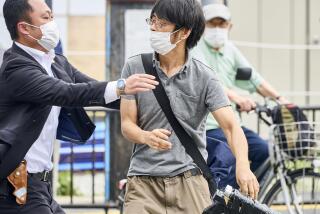Japan Weighs Tougher Juvenile Crime Laws
- Share via
TOKYO — Sixteen-year-old Takakazu Take was riding his bicycle home from a school festival when a boy from another school chased him down and mercilessly beat and kicked him. Take died 12 days later.
Finding Take’s killer was easy. But, under Japanese laws, punishing him has been almost impossible.
Japan is far more lenient toward teenage suspects than other industrial nations, such as the United States or Britain. While the question in American courts is often whether to charge youngsters as adults, the debate in Japan is whether to charge them at all.
But with the number of juveniles committing serious crimes in Japan swelling, so is a movement to rewrite long-standing laws that protect--some say coddle--young suspects.
Take’s 16-year-old attacker never had to appear before a criminal court. The most he will have to serve is two years in a reform school. Chances are his stay will be a matter of several months.
“Some teens commit crimes thinking, ‘Why not?’ ” said Susumu Oda, a psychiatrist and former juvenile facility official who is a professor at the International University of Health and Welfare.
“We are sending the wrong message--that they can get away with anything. We need to change the law.”
Laws shielding children from criminal responsibility have been on the books for decades and were rarely questioned, until a recent spate of high-profile violent crimes involving teenagers.
Particularly shocking was the arrest last year of a teenager suspected of beheading a younger boy and then leaving the head in front of a school gate with a sinister note stuffed in its mouth.
Reports of other murders committed by teenagers have become a fixture in the news media since, as has a surge in the number of assaults committed by youngsters using knives.
Though the incidence of teenage crime is still low when compared with the United States and some other countries, it is clearly on the rise. The number of juveniles committing murder, rape and other serious crimes jumped to 2,263 in 1997, up 51% from the year before.
But under laws enacted in 1949, a suspect now must be at least 16 to be considered for a criminal charge. All cases involving those younger than 16 and most cases for those under 20 are handled by more lenient family courts, which also oversee divorces.
The family courts may order counseling, monitoring at home or detention at a juvenile facility for up to two years.
To protect the privacy of the minor, family court proceedings are closed, even to the victims. Testimony and documents are not put on public record, meaning the only way to find out what happened is to file a civil lawsuit.
In response to a public outcry for action, the governing Liberal Democratic Party is proposing revisions of the juvenile laws. The Justice Ministry has also decided to consider change.
Proposals have been made to lower the age at which criminal charges are possible from 16 to 14. Another proposal would lower the maximum age covered by the juvenile laws from 20 to 18.
Such efforts are opposed by many crime experts, who say youngsters deserve gentler treatment. They say Japanese juvenile facilities have proven effective in reforming youngsters, noting the rate of repeat offenders is less than 20%.
“Why be so quick to destroy what is a big plus in Japanese society?” said Toshio Sawanobori, a professor of criminal law at Kokugakuin University in Tokyo.
But to many people, the justice system appears overly worried about the future of the juvenile wrongdoer--at the cost of the victim.
Critics say that the laws are outdated, born of a time when most crime was caused by poverty, and that what counts now is the need to protect the individual on the street.
Because of the closed nature of the current system, victims or their families are often unable to find out even the most basic information regarding the trial of an accused teenager.
Take’s mother, Ruriko, said the family court refused to give her any information about what was done to the boy who killed her son. She said her son’s school told her the accused was sent to a juvenile facility.
Beyond that, she knows nothing.
In disgust, she and several other couples whose children were murdered by teenagers formed the Assn. for Victims of Juvenile Crimes.
The formation of the group generated some media attention for their frustrations, but Take’s mother says she has yet to find solace from Japan’s legal system.
“How could there be real remorse when even the facts aren’t made clear?” she said.
More to Read
Sign up for Essential California
The most important California stories and recommendations in your inbox every morning.
You may occasionally receive promotional content from the Los Angeles Times.













